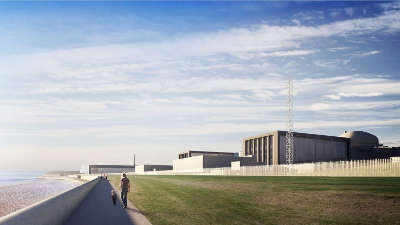Ministers have decided to back the Hinkley Point C nuclear power station but will impose a new legal framework covering future foreign investment in Britain’s critical infrastructure.
In a statement, the Government said that it has decided to proceed with the project following a comprehensive review and a revised agreement with EDF.

An artist's impression of the new plant
However, ministers will subsequently impose a new legal framework for future foreign investment in Britain’s critical infrastructure, which will include nuclear energy and apply after Hinkley.
Greg Clark, secretary of state for business, energy and industrial strategy, said: ‘Having thoroughly reviewed the proposal for Hinkley Point C, we will introduce a series of measures to enhance security and will ensure Hinkley cannot change hands without the Government’s agreement. Consequently, we have decided to proceed with the first new nuclear power station for a generation.
‘Britain needs to upgrade its supplies of energy, and we have always been clear that nuclear is an important part of ensuring our future low-carbon energy security.’
The Government’s agreement in principle with EDF means that it will be able to prevent the sale of EDF’s controlling stake prior to the completion of construction, without the prior notification and agreement of ministers.
Existing legal powers, and the new legal framework, would mean that the Government was able to intervene in the sale of EDF’s stake once Hinkley is operational.
Future controls
The new legal framework for future foreign investment in British 'critical infrastructure' will mean that after Hinkley, the Government will take a special share in all future nuclear new build projects which will ensure that significant stakes cannot be sold without the Government’s knowledge or consent.
There will also be reforms to the Government’s approach to the ownership and control of critical infrastructure ‘to ensure that the full implications of foreign ownership are scrutinised for the purposes of national security’.
This will include a review of the public interest regime in the Enterprise Act 2002 and the introduction of a cross-cutting national security requirement for continuing Government approval of the ownership and control of critical infrastructure.
The Government said these changes will bring Britain’s policy framework for the ownership and control of critical infrastructure into line with other major economies.
Alasdair Reisner, chief executive of the Civil Engineering Contractors Association (CECA) said: ‘CECA commends the Government on recognising the fundamental importance of large-scale infrastructure to a growing economy, and look forward to other positive decisions in this regard.'
A spokesman for CGN (China General Nuclear Power Corporation), a major investor, said: ‘We are delighted that the British Government has decided to proceed with the first new nuclear power station for a generation.’
Jean-Bernard Lévy, Chairman of EDF Group said the decision marked 'the relaunch of nuclear in Europe'.
EDF added that it now expects 64% of the project’s value to be spent in the UK.
The decision follows an announcement in July that ministers would delay giving their approval for the project.
Register now for full access
Register just once to get unrestricted, real-time coverage of the issues and challenges facing UK transport and highways engineers.
Full website content includes the latest news, exclusive commentary from leading industry figures and detailed topical analysis of the highways, transportation, environment and place-shaping sectors.
Use the link below to register your details for full, free access.
Already a registered? Login